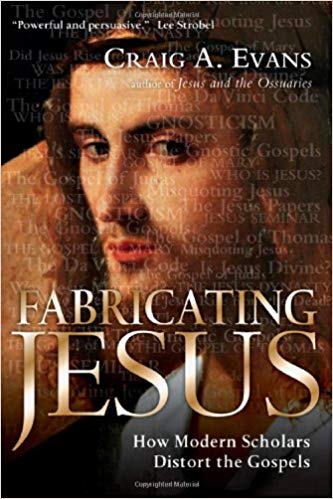Given the high praise so widely given Fabricating Jesus by Craig Evans, and given the book’s subtitle, How Modern Scholars Distort the Gospels, I had hoped to find a scholarly engagement, albeit accessible to a lay audience, with the methods and arguments of “modern scholars”.
 The book generally avoids doing anything like this. Rather, it is a strong statement of the correct views and interpretations according to Craig Evans, mixed with sermonizing laments that some Christians have made shipwreck concerning the faith because of their misguided learning and enquiries. If books like Fabricating Jesus are held up as “powerful and persuasive” arguments — that’s the description by Lee Strobel on the dust jacket — for fundamentalist faith then fundamentalists are betrayed. They do not have in this book anything like an understanding of the issues required to engage a sceptic in debate. They have nothing more than a book that makes strong noises supportive of their faith, that gives strong assurances that they don’t have to worry, or even think about, or honestly investigate the issues for themselves. They have only an empty illusion that here is an authority that demolishes the “distortions” of “modern scholarship”.
The book generally avoids doing anything like this. Rather, it is a strong statement of the correct views and interpretations according to Craig Evans, mixed with sermonizing laments that some Christians have made shipwreck concerning the faith because of their misguided learning and enquiries. If books like Fabricating Jesus are held up as “powerful and persuasive” arguments — that’s the description by Lee Strobel on the dust jacket — for fundamentalist faith then fundamentalists are betrayed. They do not have in this book anything like an understanding of the issues required to engage a sceptic in debate. They have nothing more than a book that makes strong noises supportive of their faith, that gives strong assurances that they don’t have to worry, or even think about, or honestly investigate the issues for themselves. They have only an empty illusion that here is an authority that demolishes the “distortions” of “modern scholarship”.
Will try to explain here for any fundamentalists relying on the wisdom contained in Fabricating Jesus why they will fail completely to engage a student of a “liberal modern scholar” or Bible sceptic.
But first, I wonder if this book was able to win a few of its accolades, such as “exposes the misinformed nonsense that has confused the reading public over the past few years”, by including a discussion of Michael Baigent and Richard Leigh and their The Holy Blood and the Holy Grail in the same volume he discusses the Jesus Seminar. I haven’t yet bothered to read his critique of those authors since the nonsense they have peddled (and even had to concede is fiction in order to make a copyright challenge against Dan Brown) has been amply demonstrated by journalists in the mainstream media.
 “Jesus at the MOMA” Kathy Moniot art, http://web.archive.org/web/20080828122756/http://www.kmoniot.com/art2.html
“Jesus at the MOMA” Kathy Moniot art, http://web.archive.org/web/20080828122756/http://www.kmoniot.com/art2.html
Preface
Craig Evans opens his Preface by lightheartedly comparing his “journey” to the Christian faith with that of Paul. He was diverted from a career in the law to a life of faith while at college.
But the apparent intent of this Preface is to inform the reader that he is more learned in areas that matter than many of the Jesus Seminar scholars, and that the latter are misguided dilettantes by comparison.
In college he “majored in history”, and the reader soon sees the significance of this datum when he reads several times that Evans states categorically that virtually no scholar trained in history would ever come to the conclusions of some of the sceptics he discusses.
The biting sermonizing tone of the book is felt early:
Professor Mack was in those days . . . at that time a warm-hearted Christian scholar. . . . Times change and so do some people. (p.10)
Evans claims that his background studies in “the Greek and Aramaic versions of the Old Testament, the Dead Sea Scrolls and early rabbinic literature were an enormous asset in the study of Jesus and the Gospels.” He believes “the oddness of much of the work of the Jesus Seminar” is to be blamed on too many New Testament scholars lacking the same depth of knowledge of “early rabbinic literature and the Aramaic paraphrases of Scripture” (this particular deficit is repeated for emphasis on the same page), of deficient “training in the Semitic background of the New Testament”. He even complains that only “[f]ew have done any archaeological work.” I wondered about the relevance of this latter point, but on page 220 Evans writes that the archaeological “evidence for the existence of Jesus . . . is overwhelming” (p.220).
Regrettably I did not see any instance in Fabricating Jesus where Evans demonstrates where his superior understanding or practical experience in these areas was used to undercut the methods and arguments that have led some scholars to question the veracity of the Bible.
Interestingly, Evans says that his studies in biblical criticism challenged not the essence of the Christian message but “the baggage that many think is part of the message.” And of what does this baggage consist?
- views of authorship of the gospels (e.g. that they are written by the apostles)
- view of the dates of biblical books (e.g. that they are early)
- assumptions regarding the nature of biblical literature (e.g. gospels are history only)
- assumptions about the nature of Jesus teaching (e.g. that Jesus taught only new things)
The examples Evans offers for each bit of “baggage” are important. He is using those examples to narrow the real meaning of what he thinks is baggage in each case. He will not concede, for example, that whoever wrote the gospels was doing anything other than relying on orally transmitted memories of the eyewitnesses of Jesus. Nor will he concede for a moment the possibility the nature of the gospels could be something quite apart from anything truly historical. Nor that the assumptions about the nature of Jesus’ teaching could embrace sayings and proverbs from other sources put into his mouth.
In other words, despite the apparent disclaimer, Evans is, it must be said, playing word games. These four items of baggage are only baggage so long as they stay within limits that nonetheless support the conservative Christian message. In other words they are not baggage at all to Evans. They are really the container of his faith with a built in limited elasticity. He speaks of “baggage” but really means “limited elasticity”.
“Fabricating Jesus is a book that takes a hard look at some of the sloppy scholarship . . . that [has] been advanced in recent years. . . . Some of it, frankly, is embarrassing.” I’ll have a look at chapter one of this book and see how Evans begins his treatment of some of this “sloppy” and “embarrassing” scholarship.
If you enjoyed this post, please consider donating to Vridar. Thanks!

I loved Evans’ criticism of the Jesus Seminar in The Case for the Real Jesus. Evans told Lee Strobel that his greater understanding of the Semetic background of the New Testament enabled him to see connections they missed like the true meaning of the phrase “Son of Man.” According to Evans, liberal scholars’ “didn’t know how it was linked to the Son of Man figure in Daniel 7, where there are divine implications.” Apparently it took Evans years of study to find a link that is footnoted in almost every published translation of the Bible.